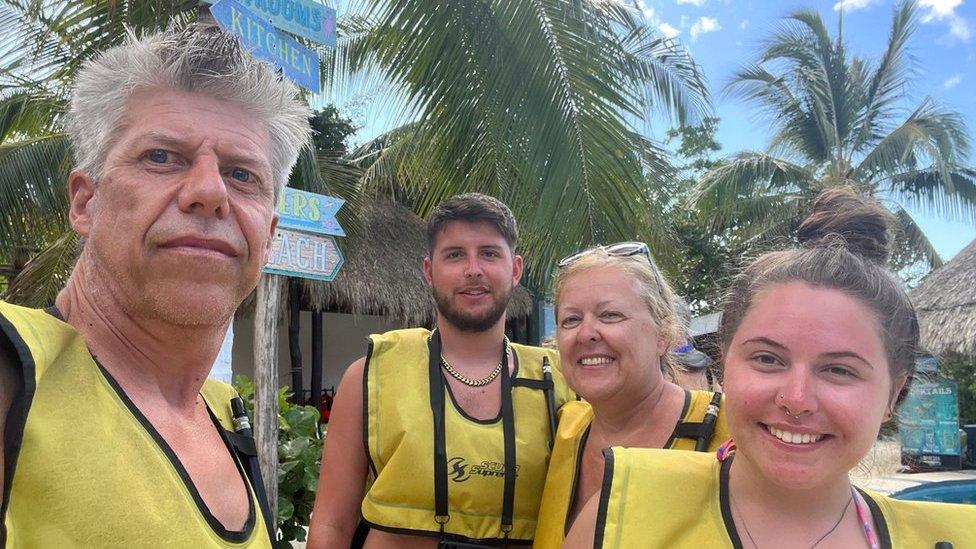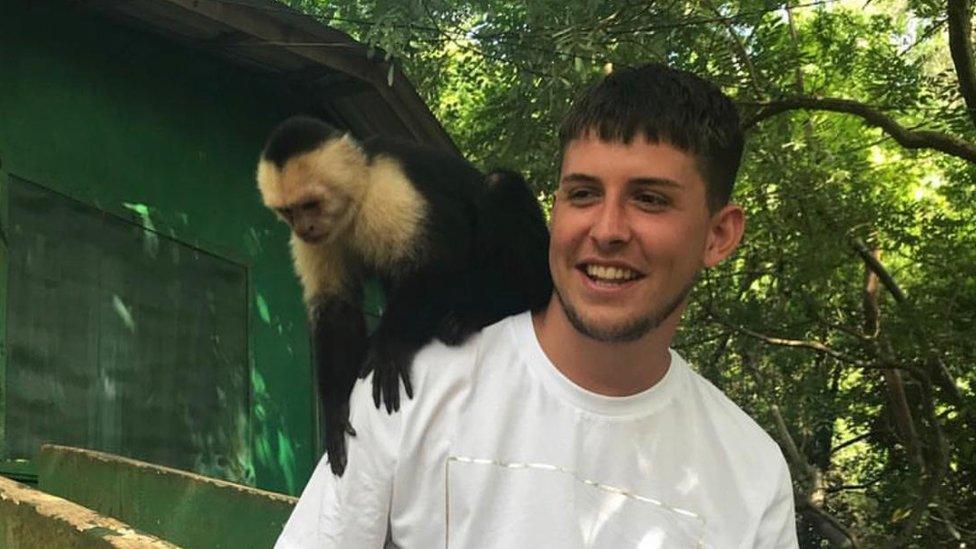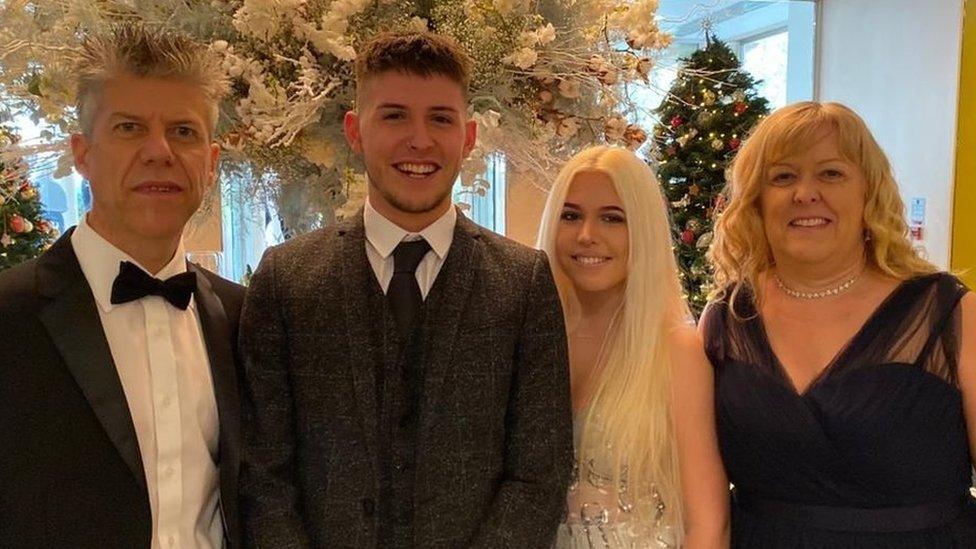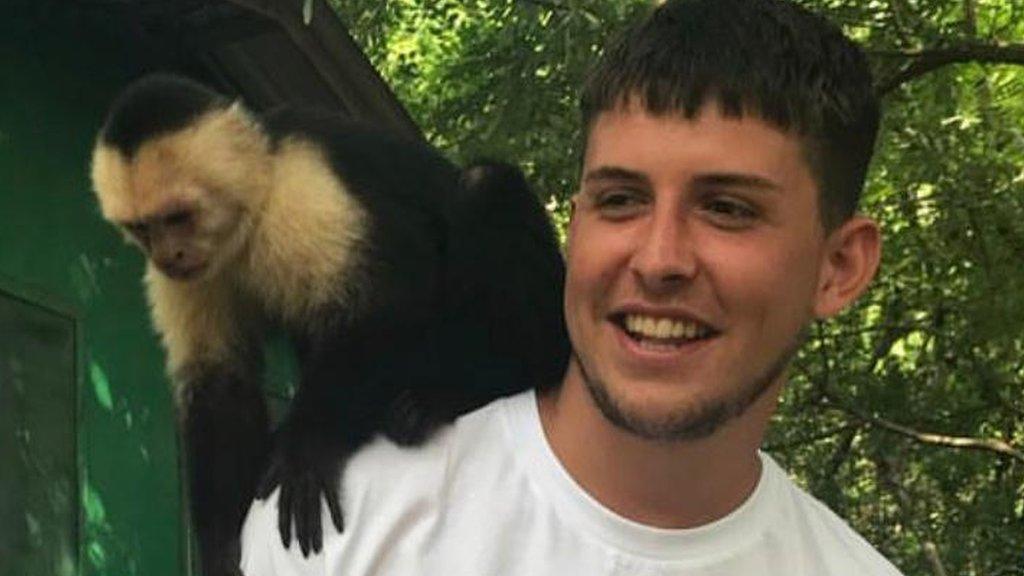Danny Castledine death: Mum wants schools to help prevent knife crime
- Published

Alison Castledine, pictured here with her family, wants to prevent other people dying from knife crime
The mother of a British student who was stabbed to death in Amsterdam believes schools should have a legal responsibility to prevent knife crime.
Alison Castledine, who is a head teacher herself, lost her son Danny Castledine when he was killed in a seemingly motiveless attack.
His family have set up a charity in his memory called The Danny C Foundation, external.
One of its main aims is to campaign for mandatory knife crime education in schools.
Mrs Castledine, from Mansfield in Nottinghamshire, wants children to be taught about knife crime as part of the curriculum and wants teachers to be trained in preventing it.
"Staff have to do Prevent [anti-terrorism] training and female genital mutilation [FGM] training, but in a lot of areas they are far less likely to happen," said Mrs Castledine.
"We had an incident with a seven-year-old bringing a knife into school, so it's happening all the time, but people don't want to tackle it.
"The most crime with knives happens around four o'clock, external, when children come out of school."

Danny Castledine's family said he loved travelling
Mrs Castledine is head teacher of Newlands Junior School in Mansfield, where teachers have already been delivering knife crime lessons to pupils as part of a programme trialled by the charity.
The lessons were delivered with the help of her daughter, Chloe Castledine, who planned the content.
Mrs Castledine said the feedback had been positive.
One member of staff said: "It was incredibly concerning to see how many of my students thought it was okay to carry a knife for self-defence, or that you are allowed out of prison at Christmas."
Another said: "At the year six leavers assembly, the students were asked what was the most valuable topic they learned at their time at Newlands. They chose this programme of work. I think that says it all."
The programme is now being offered to other schools through the charity's website, external.
While schools are not currently required to help prevent knife crime, the Department for Education said schools can choose to do so.
A spokesperson said: "Schools can tailor their teaching to address issues that their pupils face, including focusing on knife crime as part of criminal exploitation and peer pressure taught as part of the relationships, sex, and health education curriculum."

Mr Castledine was stabbed in Amsterdam in the early hours of 1 June 2022
The charity will officially launch at the National Justice Museum in Nottingham on 15 June.
Another aim of the charity is around improving safety for new students; and pressuring universities to be proactive around student safety.
This is because Mr Castledine, who was a student himself, was on a night out when he was attacked on 1 June 2022.
He had lost the friend he was with, and his family believe he was unable to get back safely to the hotel because his phone had been stolen.
"The hotel was 30 minutes from the town centre, and they had used Google Maps to get into the centre," said Mrs Castledine.
He was seen approaching various strangers on CCTV footage, and his family believe he had been asking for help.
He eventually started talking to a Belgian man who seemed friendly at first in the CCTV footage, but then attacked Mr Castledine, stabbing him 30 times in the head and neck.

Danny Castledine's family have set up a charity in his name
The killer, referred to as Nongo B, was given a 14-year prison sentence after being convicted of manslaughter.
The Court of Amsterdam, in a written judgement, said there was "no obvious motive" for the killing.
The court judgement said the killer, who was 22 at the time, was "heavily under the influence of medicines and narcotics" when he was arrested.
Reports by a psychiatrist and psychologist came to the conclusion he "has a serious disorder" relating to his addiction to the drugs Oxycodone, benzodiazepines and cannabis.
However, the court judgement said it was not clear whether the killer was under the influence of the substances at the time of the offence, because he was arrested and tested for drugs 10 hours after the killing.
The experts also could not substantiate whether or not his disorder made him violent.

Follow BBC Nottingham on Facebook, external, on X, external, or on Instagram, external. Send your story ideas to eastmidsnews@bbc.co.uk, external or via WhatsApp, external on 0808 100 2210.
Related topics
- Published9 February 2024

- Published28 October 2022
